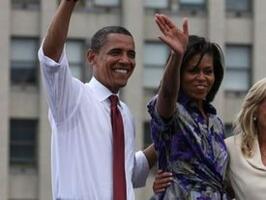Health Care Law Is Still Fighting For Its Life By Scott Rasmussen
Having survived the Supreme Court and the November elections, President Obama's health care law now faces an even bigger hurdle: the reality of making it work.

Having survived the Supreme Court and the November elections, President Obama's health care law now faces an even bigger hurdle: the reality of making it work.

Raising taxes on the rich alone won't close the deficit or erase the national debt, as Republicans superciliously inform us over and over again. But in their negotiations with the White House to avert the so-called fiscal cliff, congressional Republicans seem obsessed with a change in Medicare eligibility whose budgetary impact (when compared with ending the Bush tax cuts for the wealthy) is truly negligible -- but whose human toll would be immense.

Is Barack Obama bluffing when he threatens to go over the fiscal cliff if Republicans refuse to agree to higher tax rates on high earners?

Ah, the great American West, where man can generally breathe free and also inhale -- woman, too. Thank you, thank you, voters in Colorado and Washington state, for legalizing marijuana. But will Washington, D.C., leave you alone? Attorney General Eric Holder said this week that the Justice Department will weigh its response to the state referenda.

Politicians claim they make our lives better by passing laws. But laws rarely improve life. They go wrong. Unintended consequences are inevitable.
Most voters don't pay enough attention to notice. They read headlines. They watch the Rose Garden signing ceremonies and hear the pundits declare that progress was made. Bipartisanship! Something got done. We assume a problem was solved.

Nothing like a debt-ceiling brawl to raise the public's anxiety levels. The Republican threat two summers ago to let America default on its borrowing helped lower America's credit rating and sent consumer confidence back into intensive care. The people were not amused.

Is mass migration from Mexico to the United States a thing of the past? At least for the moment, it is. Last May, the Pew Hispanic Center, in a study based on U.S. and Mexican statistics, reported that net migration from Mexico to this country had fallen to zero from 2005 to 2010.

If President Obama honestly wants to negotiate an agreement with Republicans before the year-end fiscal deadline, he must be deeply frustrated. And if he doesn't really want to negotiate with them, then he should be delighted, for the same reason: Their latest "offer" laid before him by House Speaker John Boehner demonstrates again their refusal to reveal their true intentions -- and their inability to do simple arithmetic.

President Obama is winning the messaging wars in the "fiscal cliff" debate largely because Republicans aren't even in the game.
The GOP leadership in Washington keeps talking as if the issue is deficit reduction, while the president is talking about fairness.

The fiscal cliff negotiations seem to be foundering on Barack Obama's insistence on higher tax rates on high earners and House Republican leaders' insistence on opposing them. The president believes he has a mandate from voters for his position, and House Republicans believe they have a mandate from voters for theirs.

As global warming causes more serious and frequent shoreline flooding, indignation rises over federal programs helping owners of beach properties rebuild in places the ocean wants to take back. Superstorm Sandy was a lollapalooza in terms of waterfront damage and demands on the Federal Emergency Management Agency's resources.

With America's "fiscal cliff" approaching, pundits wring their hands over the supposed catastrophe that government spending cuts will bring. A scare newsletter called "Food Poisoning Bulletin" warns that if government reduces food inspections, "food will be less safe ... (because) marginal companies ... (will) cut corners."

On a recent "Meet the Press," host David Gregory presided in a tailored jacket and tie. Panelists Al Sharpton, David Brooks and Ken Burns appeared similarly professional. But the two female panelists, Andrea Mitchell and Carly Fiorina, seemed ready for cocktails, not coffee, in form-fitting dresses, arms naked to the world.

Americans are very generous to people with disabilities. Since passage of the Americans With Disabilities Act in 1990, millions of public and private dollars have been spent on curb cuts, bus lifts and special elevators.

AARP's shot over the bow on the fiscal cliff talks is most unpleasant. Perhaps you've seen the ad on TV. As seniors go about their day, a stern female voice says of Medicare and Social Security, "We earned them." She goes on, "If Washington tries to cram decisions about the future of these programs into a last-minute budget deal, we'll all pay the price." She left out "down your throat."

As the 2012 election fades into the history books, we begin our first look at the 2014 contests for Senate, House and Governor. Let’s start with the Senate, which will be the site of an intense battle for control once again. Before looking ahead at the Republicans’ prospects to gain the six seats they need to win control of the Senate, it is first important -- though for Republicans, painful -- to look back at the past two Senate cycles.

One little noticed and quite remarkable aspect of Election 2012 is that Barack Obama won a majority of the popular vote for the second consecutive time. With the exception of Franklin D. Roosevelt's four-term run in the 1930s and '40s, it's the first time the Democrats have won a majority of the presidential vote in back-to-back elections since 1836.

In 1902, journalist Lincoln Steffens wrote a book called "The Shame of the Cities." At the time, Americans took pride in big cities, with their towering skyscrapers, productive factories and prominent cultural institutions.

With the Republican right persisting in baseless persecution of Susan Rice, the U.N. Ambassador who may replace departing Secretary of State Hillary Clinton, it has left President Obama little choice but to move ahead with her nomination. If he backs away from Rice, in the face of what he has called false accusations against her, that display of weakness would undermine his second term before it begins.

Insider trading leads the news again, casting a cloud over Steven Cohen's SAC Capital Advisors $14 billion hedge fund.
The SEC charged Mathew Martoma, who used to manage a SAC Capital division, with using inside information about tests on an Alzheimer's drug to trade stock of the company working on it.
The media love this stuff. I imagine reporters sitting around saying: "The SEC finally will punish greedy Wall Street! These tycoons rig the game -- cheating is how they acquire $14 billion -- and now noble government prosecutors will bring justice."